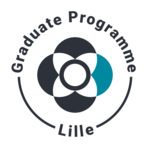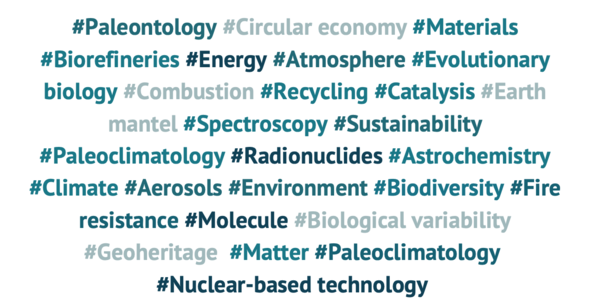Science for a Changing Planet

Specialist master’s degrees
Doctoral school

Master Tracks
9 Specialist Master’s degrees in physics, chemistry, biology and Earth science

Research topics
spectroscopy; molecular and reactivity scale characterisation; rapid reaction characterisation; molecular imaging; applications in molecular synthesis; materials science; modelling; 'green chemistry'; new energy sources.
Further information : Parcours ASC
Erasmus Mundus Joint Master Degree Advanced Spectroscopy in Chemistry (ASC)

Research topics
Search for alternative solutions to fossil resources from biomass.
Training in the new concept of "biorefinery" including the study of multiple (non-edible) feedstocks, multiple processes (chemical, biochemical, thermochemical) and multiple products (fuels and chemicals for aviation).
Train students to broaden the scientific and technological understanding of the biorefinery concept.
This master's degree is co-accredited by the University of Lille and Centrale Lille Institut.
Further Information: Parcours Biorefinery
Erasmus Mundus Joint Master Degree BIOREF

Research topics
Smart functional materials, colloidal dispersions in nanomedicine, advanced catalytic processes, visualisation of chemical reactivity (chemical modelling and transient spectroscopies)
The Master includes 12 months of experimental teaching (practical work) and laboratory internships.
Master co-accredited by the University of Lille and Centrale Lille.
Further Information: Parcours IRACM
Research topics
Studies of the physical and chemical properties of the atmosphere from the molecular to the global scale, analytical sciences applied to air, atmospheric modelling, air pollution and climate change.
Master's course in the stimulating environment of the Labex CaPPA and associated laboratories.
Further Information: Parcours Atmospheric Sciences
Research topics
High-level physics with a choice of specialisation from condensed matter, materials science and applications, pharmaceutical materials, dilute matter and spectroscopy, atmospheric science or molecular and atomic scale modelling.
Training in micro to nanoscale characterisation methods (diffraction methods, optical and mass spectroscopies, electron microscopy) and theoretical foundations of physics.
Further Information:
At M1 level: Physics of the 21st century master track
At M2 level: Matter, Molecules and their Environnement master track
Beware! When applying for a graduate programme scholarship: at M1 level, choose M1 Physique Appliquée, at M2 level choose Matter, Molecules, Environment (MME)
Research topics
Evolutionary biology, particularly in population genomics, evolutionary genomics, statistics and modelling.
Upon graduation, you will have a good understanding of ecological concepts, bioinformatics tools and NGS data management.
Further Information: Parcours EVOBIO
Research topics
Fundamental and applied palaeontology.
Training in methods of analysis, processing and intervention in sedimentary geology; application of principles and technical skills to palaeontological and palaeoenvironmental analysis; technical skills in applied palaeontology and geoconservation
Further Information: Parcours PALEO

Research topics
Basic and applied palaeontology, including geoconservation and geoheritage.
You will be able to respond to the academic challenges posed by the renewed need for palaeontological expertise in response to societal demands. You will have a better understanding of geobiological processes such as those that trigger an ecological crisis.
Further Information: Erasmus Mundus Joint Master Degree PANGEA

Research topics
The European Master programme 'BIO&PHArmaceutical Materials science' (BIOPHAM) is a two-year programme entirely taught in English and jointly operated by the University of Lille (France), the University of Pisa (Italy), the University of Silesia in Katowice (Poland) and the Polytechnic University of Catalunya in Barcelona (Spain). BioPham aims at the emerging new discipline of “pharmaceutical materials science” by offering a very rich education and training programme at the interface between physics/chemistry of materials and pharmaceutical sciences. BioPham Master programme provides students with various transversal skills such as competencies in entrepreneurship, project management, economic and strategic intelligence, marketing, bibliographical search and synthesis.
Our Master helps reducing the severe lack of human resources in the vast research-based pharmaceutical sector including academic centres, Big Pharma, SME’s, spin‐offs, start‐ups, contract research organizations or drug manufacturers. To achieve this, we have a plethora of academic and industrial associated partners offering our students field internship opportunities.
Website : www.master-biopham.eu
Apply online: www.master-biopham.eu/how-to-apply/apply-now
Contact: master-biophamuniv-lillefr
PhD & Graduate School
1 Graduate School is involved in the Graduate Programme
'Sciences de la Matière du Rayonnement et de l'Environnement' (SMRE)
Two ways to join the Graduate Programme

IF YOU ARE A MATER STUDENT
Follow either the StudyinFrance registration procedure by Campus France or the E-candidat procedure (depending on your country of residence)
More information on the Ulille courses catalogue pages or directly to the detailed master’s tracks list.

IF YOU ARE A PhD STUDENT
Check the available thesis topics published by the Graduate Schools and contact the thesis supervisor beforehand.
There is no specific procedure for joining the Graduate Programme as a PhD student. Only an agreement in principle between the Graduate Programme, your supervisor and yourself will be valid provided that you have a thesis subject in line with the research themes of the Graduate Programme